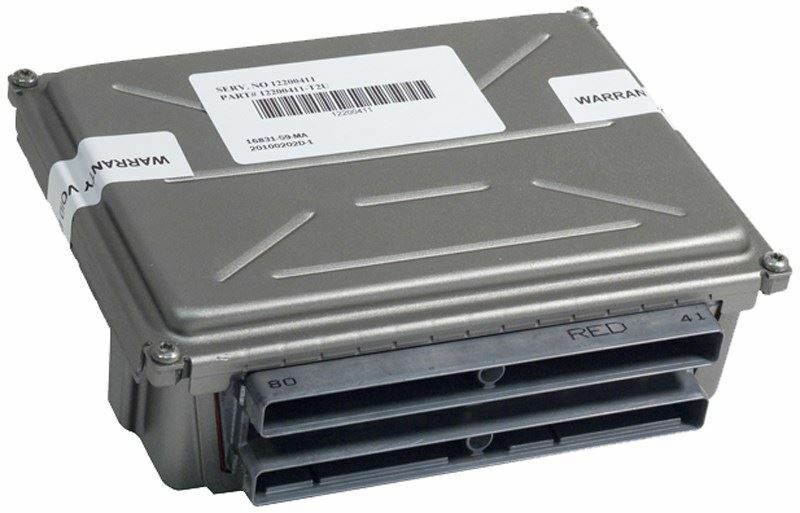Restore Peak Performance to Your GM Truck or Van
Is your 2003 GMC Sierra 3500, Silverado, or another compatible GM vehicle suffering from perplexing issues like a persistent check engine light, erratic shifting, poor fuel economy, or even a no-start condition? These are classic signs of a failing Powertrain Control Module (PCM), the central computer that manages your vehicle’s engine and transmission. A faulty PCM can disrupt vehicle operations, leaving you stranded and facing costly diagnostic bills. This replacement PCM, part number 12581565, is the definitive solution to restore your vehicle’s reliability and drivability.
Unlike a generic part from a local store, this module is not just a component; it’s a complete, ready-to-install solution. We take the guesswork and hassle out of the repair by programming the module specifically for your vehicle using your VIN. This ensures that it has the latest GM software updates and communicates flawlessly with all other systems in your truck or van, just as the original did from the factory. You get a component that is prepared for your exact configuration, saving you a trip to the dealership for expensive programming.
Diagnosing a Faulty 2003 Sierra 3500 PCM
The Powertrain Control Module is the brain of your vehicle’s operation. When it begins to fail, it can cause a wide array of symptoms that can often be mistaken for other issues. If you’re experiencing several of the following problems, a failing PCM is a likely culprit. This module is the correct fix for many GM vehicles from this era, including the powerful 8.1L V8 and the workhorse 4.3L V6 engines.
From the Diagnostic Bay
We had a 2003 Silverado 2500 with the 8.1L engine come into the shop with a complaint of intermittent stalling and harsh shifting. The owner had already replaced the throttle position sensor and the mass airflow sensor, but the problem persisted. After connecting our diagnostic scanner, we noticed communication dropouts with the PCM. We tested the power and ground circuits to the module, which were all solid. This confirmed our suspicion: the internal logic of the original PCM was failing. We installed one of our pre-programmed modules, performed the quick security relearn, and the truck ran perfectly. The customer was relieved to finally have a reliable vehicle again after chasing the wrong parts.
Symptoms of a Failing Powertrain Control Module
- ✔ Check Engine Light: The most common indicator, often with codes related to module communication (U-codes) or multiple unrelated sensor failures.
- ✔ Engine Performance Issues: You may experience rough idling, stalling, hesitation during acceleration, or a noticeable loss of power.
- ✔ Poor Fuel Economy: A failing PCM can’t properly manage the air-fuel mixture, leading to a sudden and significant drop in MPG.
- ✔ Transmission Problems: The PCM also controls transmission shift points. Failure can cause harsh shifting, delayed engagement, or getting stuck in one gear (limp mode).
- ✔ No-Start Condition: The engine may crank but refuse to start if the PCM is not correctly firing the fuel injectors or ignition coils.
- ✔ Failed Emissions Test: Inability to properly manage engine parameters will almost certainly lead to a failed smog check.
A Simple, Programmed Solution
Replacing a PCM used to be a complicated job requiring specialized tools and a dealership visit. We’ve simplified the process. When you order, you provide us with your vehicle’s 17-digit VIN. Our technicians then use this information to flash the module with the correct, factory-specified software for your truck’s engine, transmission, and options. The module arrives at your door ready for installation. In most cases, it’s a direct plug-and-play replacement. For some vehicles, a simple security relearn procedure may be necessary, which can typically be done in your driveway without any special tools.
This module is a direct replacement for multiple service numbers, including: 12581565, 8125815650, 12570557, 12570558, 12576106, 12576869, 12578127, 8125781270, 88864822, and 89017733.
Frequently Asked Questions
Do I need to program this module?
No. This module comes fully programmed to your vehicle’s specific VIN before it is shipped. You just need to provide us with your VIN during or after checkout. This service is included in the price.
Where can I find my vehicle’s VIN?
Your 17-digit Vehicle Identification Number (VIN) can be found on your vehicle’s registration, insurance card, or on the driver’s side of the dashboard visible through the windshield. It may also be on a sticker in the driver’s side door jamb.
Is any additional setup required after installation?
In many cases, the module is plug-and-play. However, some GM vehicles may require a security relearn procedure (also known as a CASE learn) to sync the new PCM with your vehicle’s anti-theft system. This is a simple procedure that typically involves turning the key on and off in a specific sequence and does not require special tools.
How can I be sure the PCM is the problem?
While the symptoms listed are strong indicators, it’s always best to have a proper diagnosis performed. This includes checking for consistent power and ground at the PCM connector and ruling out wiring or sensor issues. If you see communication error codes (U-codes) or multiple, unrelated sensor codes, it points strongly to a faulty PCM.
This part number fits many vehicles. How do I know it’s right for mine?
This PCM hardware is used across a wide range of GM vehicles. The key is the programming. By flashing the module with the software that corresponds to your specific VIN, we make it the correct part for your exact vehicle and its options. Matching one of the compatible service numbers listed ensures the hardware is correct for your application.


